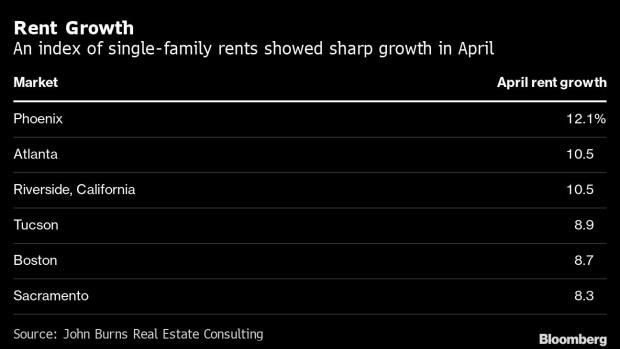Jun 16, 2021
Billionaires back startup that wants to let anyone be a landlord
, Bloomberg News
Toronto housing demand will remain strong for the medium to long term: TRREB analyst
Jeff Bezos and Marc Benioff are backing a startup that lets regular people invest small amounts of money in single-family rental properties, as the pandemic-fueled housing market continues to attract a flood of capital.
Arrived Homes, which offers shares in rental properties for as little as US$100, raised US$37 million in equity and debt from a group of investors that includes Bezos Expeditions, the personal investment company of the Amazon.com Inc. founder, and Benioff’s Time Ventures. The round was led by Core Innovation Capital, according to a statement on Wednesday.
The startup, founded in 2019, has acquired 15 homes and is in contract for 18 more. It plans to use the new funds to buy more properties as it tries to democratize a corner of real estate investing that has been the domain of affluent individuals and – more recently – Wall Street firms.
“There are millions of people who want to own property and don’t have a way to do it,” Chief Executive Officer Ryan Frazier said in an interview. “The reason they don’t invest is that there are huge barriers.”
Frazier, who founded the company with Kenny Cason and Alejandro Chouza, sees three main impediments that would-be investors face: The cost of buying a rental property, the time it takes to find one and the confidence to take the plunge.
His solution was to embrace a regulatory framework that allows the company to sell shares in individual properties to U.S. residents, regardless of the investor’s wealth or income. The company hires third-party property managers so it can spread acquisitions across markets, allowing investors to buy shares in homes that vary by geography or expected rent.
The average investment so far has been US$1,800 across two or three houses. The company anticipates enough demand from investors to acquire as many as 100 homes a month by the end of the year.
With the housing market running hot, properties have been hard to find, both for regular buyers and investors. The low inventory, meanwhile, has helped landlords command higher prices: A single-family rent index compiled by John Burns Real Estate Consulting increased 5.9 per cent in April from a year earlier.

Historically, single-family rentals were dominated by local investors, who might own a handful of properties in their hometown. That changed following the U.S. foreclosure crisis, when Wall Street firms snapped up distressed homes at auction and developed systems for managing properties across sprawling geographies.
Still, rental houses were largely ignored by big investors until COVID-19 set Americans racing for larger suburban living spaces. Brookfield Asset Management Inc., Nuveen Real Estate and others have committed billions to purchasing rental homes since the beginning of last year.
“People have always been interested in real estate investing, but it’s gone from spectator sport to more of an active game given the ability to do more and more online,” said Rick Sharga, executive vice president at RealtyTrac, which provides property data for investors. “You put up the money and someone else buys the real estate and manages it for you and sends you a check every month.”
While the recent influx of institutional capital has attracted attention, mom-and-pop investors still own the vast majority of rental houses. Arrived Homes isn’t the first company to allow small bets on single-family rentals.
Roofstock, an online marketplace for rental houses, offers fractional ownership to affluent investors. Fundrise, another online real estate investment platform, recently lined up a US$300 million credit facility from Goldman Sachs Group Inc. to buy newly built single-family rental houses.
Fundrise has acquired or is under contract for roughly 2,000 homes, often outbidding institutional investors. It wants to buy more than 25,000 properties in coming years, according to CEO Ben Miller.
“We’ve been able to lower our operating costs below those of traditional real estate companies,” Miller said in an email. “We believe this gives a competitive advantage, allowing us to win more deals while simultaneously providing better overall returns to our investors.”




